Showing 86–90 of 533 results
-
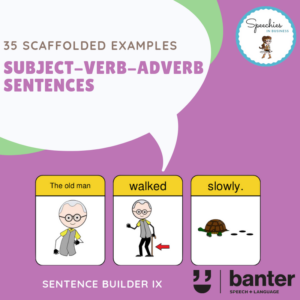
$5.99 including GST
In this 21-page no preparation pack of scaffolded sentences, we target the very common Subject-Verb-Adverb structure. Most typically developing children acquire this pattern at about the age of 24-30 months. But many people – including people learning English as a second language, and people with developmental language disorders, take longer and need practice to acquire it.
-
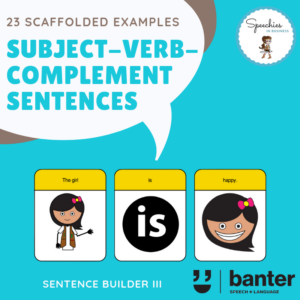
$5.99 including GST
This is the third in our series of sentence builders, focusing on Subject-Verb-Complement constructions, e.g. “The boy is smart.”.
Typically developing children usually acquire this sentence structure at around the age of 2-2 1/2 years of age, although people who are learning English as a second language and/or have a communication disorder may struggle to grasp the pattern.
This no-preparation pack is designed to help support people who need help with these sentences, and features high frequency, present tense verbs to help stimulate oral language development.
-
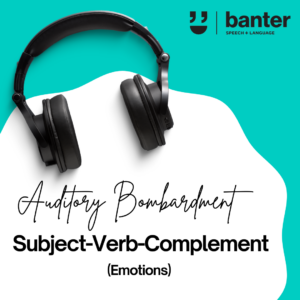
$3.99 including GST
Some children have difficulties putting their words into the right order in sentences, for instance, subject-verb-complement sentences like “The boy is happy.”.
In this audio recording, children can listen to sentences about what people are doing.
For this grammar goal, we provide a short .m4a recording and a script with pictures, so that, daily, children can:
- simply listen to the recording as they play nearby or sit in the car;
- listen to our recording as they look at the pictures; or
- have a family member read the script to the child in a shared reading format.
-
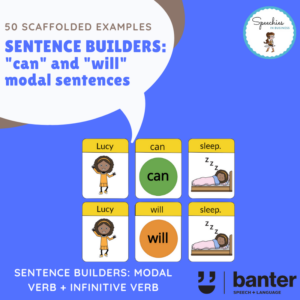
$5.99 including GST
Between 30-36 months of age, typically developing children start to use early modal verbs (e.g. can, will) with infinitives in their sentences. Modal verbs are used to show if an action is certain to occur or possibly occur. Modal verbs are also used to talk about people’s ability to do certain actions and skills.
John can cook. John will cook.
The girl can dance. The girl will dance.
When using this 28-page pack, the adult models the ‘can’ sentence (“Dad can dance.”) and asks the child to repeat the sentence. Then the adult asks the child “What will [Dad] do?” The child responds with “Dad will dance.”. The adult recasts any incorrect responses and then repeats the sentence (“Yes, Dad will dance.”).
-
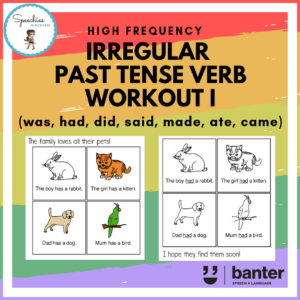
$5.99 including GST
In our 28-page Pack 1, we cover seven of the highest frequency verbs in English with irregular past tense forms: was, had, did, said, made, ate, came. We tackle them one at a time, with “mini-stories” for each verb. We then put them all together for extra practice and revision.





